Key points:
- Play is fun, voluntary, and teaches adaptability through patterns of repetition and variation.
- It allows children to explore their interests independently, fostering intrinsic motivation and growth.
- Play teaches rules, decision-making, self-control, and emotional management.
- It helps children make friends, cooperate, and learn joyfully.
What characterizes play and makes it so special?
Play is fun: babies giggle contagiously over Peek-a-boo or they enjoy playing hide and seek. Play is voluntary: it is something that we naturally enjoy doing and is not instructed to us. Play has a special structure: it has a pattern of repetition and variation. Family therapist Lawrence J. Cohen uses Peek-a-boo as an example of this in his book Playful Parenting; during Peek-a-boo, the baby can lose the connection and regain it. You can actually experiment with the time it takes to say Peek-a-boo, from half a second to two or three. You can find exactly the length of time that brings the most giggles. Too short and there is no mystery, too long and it gets scary –there is the essence of human connection, disconnection and reconnection. The gift of play is the way it teaches us to deal with the unexpected.
What are the various benefits of play?
- Play offers children an opportunity to develop a connection to their own self-guided interests.
- Children get to choose the activities that make up their free play, they learn to manage themselves, and pursue and elaborate on their own interests. Children are not motivated by praise or recognition when it comes to free play. Instead, they are intrinsically motivated, and the learning and psychological growth that results are byproducts, not goals of the experience.
- Through play, children learn about rules, decision-making, problem solving, and self-control.
- Children must restrict themselves and learn to exert control over themselves and their behavior, as well as follow the rules to be accepted and successful in games that involve collaboration. Through play, children learn to negotiate both their physical and social environments, and thus gain a sense of control over the world. This aspect of play offers great psychological benefits and children learn to exert control over circumstances, reducing anxiety. Why? Anxiety surges when individuals feel a lack of control over circumstances and, thus, gaining a sense of control helps alleviate this sensation.
- Children learn to handle their emotions during play.
- In free play, children put themselves in physically and socially challenging situations and learn to control the emotions that arise from the stressors. Physical risk with playmates such as tickle fests, wrestling, and other rough partner play helps build trust. Kids learn about impulse control, body awareness, and setting limits on play partners. Besides teaching physical and social skills, it trains kids to deal with unpredictability in events, allowing them to approach life with more flexibility.
- Play helps children make friends and helps them get along with each other.
- Social play is a natural way of making new friends and learning to treat one another in a fair manner. Learning to get along and cooperate with others is one of the most important evolutionary functions of human social play. Children learn to be aware of their playmates’ needs and attempt to meet them.
- Play is a source of happiness.
- When children are asked about the activities that bring them the most happiness, their response is very often play. Play provides an opportunity for a student to shine in areas that are not strictly academic and helps children gain a sense of pride and belonging.
Play is the language of learning. It helps children recognize and work though their emotions, while learning about the world. Kids need to get their hands dirty and work through concepts. They need to gain a sense of the world around them by manipulating materials, interacting with their peers, engaging all of their senses, and working through their thoughts and feelings.
It’s important that we, as adults, allow children both the time and the space to play outdoors on a daily basis. We need to trust them and give them the freedom they deserve to try out new theories and play schemes. Encouraging children to adapt to the world, rather than overprotecting them, seems to be the general principle of healthy functioning.
Life is about change, challenge, risks, and growth. We can’t be alive without risks. Encountering them gives children their chance to claim their place in the world, to be who they are in the world. The early years are the most important for learning; it is during this period that exploration and play take place. This helps turn children into flexible and sophisticated thinkers as adults.
Through play, children learn with joy –those things learned without joy, will easily be forgotten.









2 Responses
How about when winter comes to cold to go outside every day what do u do ?
Hi Ana,
The health benefits of staying physically active, getting some fresh air and adequate exercise outweighs the risk of chilly weather exposure. In addition, it helps children build up their immune system, it stimulates their imagination, promotes solving skills and gives them their dose of Vitamin D. It is always important to make sure children wear proper clothing and warm weather gear. Make sure your child is dressed in layers, with a hat, mittens or gloves. As a rule of thumb, dress your baby or young toddler with one layer more than you would wear. Young children’s bodies are less able to regulate internal temperature than those of adults due to their smaller surface area and smaller amounts of subcutaneous fat. So, although your child claims not to feel cold, he might still be (although their bodies don’t recognize it). However, there are exceptions. If the weather is too cold, your child should stay inside – but if it’s nice and chilly outside, then bundle your child up and let him play for at least an hour! 🙂